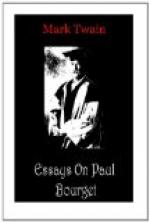You see? Your “higher Parisian” class—not everybody, not the nation, but only the top crust of the Ovation—applies to debauchery all the powers of its soul.
I argued to myself that that energy must produce results. So I built an anecdote out of your remark. In it I make Napoleon Bonaparte say to me —but see for yourself the anecdote (ingeniously clipped and curtailed) in paragraph eleven of your Reply.—[So, I repeat, Mark Twain does not like M. Paul Bourget’s book. So long as he makes light fun of the great French writer he is at home, he is pleasant, he is the American humorist we know. When he takes his revenge (and where is the reason for taking a revenge?) he is unkind, unfair, bitter, nasty.]
For example:
See his answer to a Frenchman who jokingly remarks
to him:
“I suppose life can never get entirely dull to an American, because whenever he can’t strike up any other way to put in his time, he can always get away with a few years trying to find out who his grandfather was.”
Hear the answer:
“I reckon a Frenchman’s got his little standby for a dull time, too; because when all other interests fail, he can turn in and see if he can’t find out who his father was.”
The first remark is a good-humored bit of chaffing on American snobbery. I may be utterly destitute of humor, but I call the second remark a gratuitous charge of immorality hurled at the French women—a remark unworthy of a man who has the ear of the public, unworthy of a gentleman, a gross insult to a nation friendly to America, a nation that helped Mark Twain’s ancestors in their struggle for liberty, a nation where to-day it is enough to say that you are American to see every door open wide to you.
If Mark Twain was hard up in search of, a French “chestnut,” I might have told him the following little anecdote. It is more funny than his, and would have been less insulting: Two little street boys are abusing each other. “Ah, hold your tongue,” says one, “you ain’t got no father.”
“Ain’t got no father!” replies the other; “I’ve got more fathers than you.”
Now, then, your anecdote about the grandfathers hurt me. Why? Because it had a point. It wouldn’t have hurt me if it hadn’t had point. You wouldn’t have wasted space on it if it hadn’t had point.
My anecdote has hurt you. Why? Because it had point, I suppose. It wouldn’t have hurt you if it hadn’t had point. I judged from your remark about the diligence and industry of the high Parisian upper crust that it would have some point, but really I had no idea what a gold-mine I had struck. I never suspected that the point was going to stick into the entire nation; but of course you know your nation better than I do, and if you think it punctures them all, I have to yield to your judgment. But you are to blame, your own self. Your remark misled me. I supposed the industry was confined to that little unnumerous upper layer.




